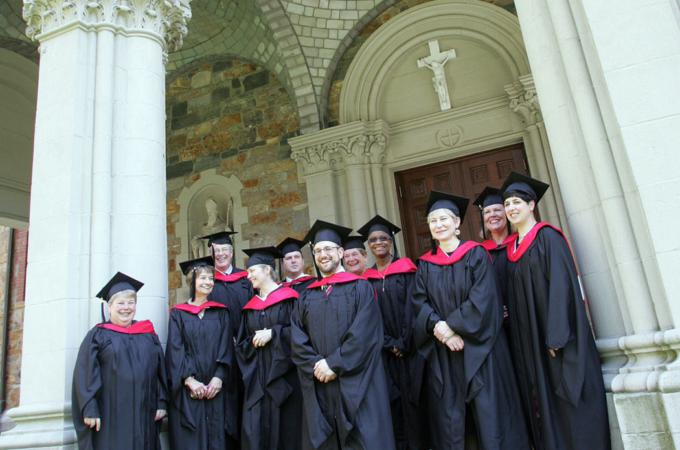Pastoral preparation through the Master of Arts in Ministry program
We need well-rounded lay ecclesial ministers. The Master of Arts in Ministry and Master of Theological Studies degree programs of St. John's Seminary provide the education and formation we need. These degrees do not focus solely on academics, they also form all aspects of the human person, which is critical to ministerial development. Each of the cornerstones -- apostolic field education, academics, spiritual and human formation -- all impacted me in a significant way. If I had to pick the one that most impacted me, I would have to say it was the apostolic field education.
As a MAM student, my first field education placement was at my home parish of St. Patrick in Stoneham. There, under the supervision of the pastoral associate, Joan Puleo, and Deacon Frank DelloRusso, I was trained to be an extraordinary minister of holy Communion, pastoral visitor, and a member of the RCIA team. I began an important pastoral relationship with a homebound parishioner, bringing the Eucharist to her home each week. I used the rite found in the Communion of the Sick booklet and we prayed together as the Church guides us to do, extending the love and companionship of the community of faith to the one who is unable to be with them for worship. I did not realize at the time that this would be a foundational experience for me. After I graduated, I became a board-certified chaplain.
In April 2017, after five years of ministry as a chaplain in two different Catholic long-term care facilities, I took a position with the Archdiocese of Boston Initiative for Palliative Care and Advance Care Planning. In my role as parish education coordinator, I offer parish pastoral teams a free presentation for their community to learn about palliative care, advance care planning, and how Catholic Church teaching supports both.
Palliative care is often misunderstood. It is important that our faith community be educated about the kind of excellent health care that is available to them from the moment of their diagnosis with a serious illness, not just at the end of life. Palliative care is also an excellent refutation of physician-assisted suicide, which is at risk of becoming legal in the state of Massachusetts. In addition to being beneficial to a person's health care decision-making, this education initiative is a key in forming people's consciences to support Church teaching on life issues in the public square.
People often share their personal health care journeys with me, which requires me to be a good listener, a valuable skill I learned during formation in the MAM program. In my work, it is important to be familiar with Church teaching and specific documents related to health care. I learned about those during my academic work at St. John's. I was a cradle Catholic, but until I received education in the MAM program, I was unaware of the significance of the Vatican II teachings, which embody the wisdom of the Church for us as we live out our earthly existence.
DIANE MCCARTHY IS A 2011 GRADUATE OF THE MASTERS OF ART IN MINISTRY PROGRAM AND PARISH EDUCATION COORDINATOR OF THE ARCHDIOCESE'S OFFICE OF PALLIATIVE CARE AND ADVANCE CARE PLANNING. FROM 2011 THROUGH SPRING 2019, THE MAM AND MTS PROGRAMS OF ST. JOHN'S SEMINARY WERE UNDER THE TITLE OF "THE THEOLOGICAL INSTITUTE FOR THE NEW EVANGELIZATION." THIS NAME HAS NOW BEEN TRANSFERRED TO THE ARCHDIOCESE, BUT THE ACCREDITED MASTER'S DEGREE PROGRAMS REMAIN WITH THE SEMINARY.



















